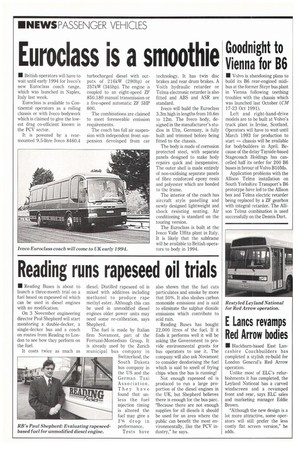Reading runs rapeseed oil trials
Page 16

If you've noticed an error in this article please click here to report it so we can fix it.
• Reading Buses is about to launch a three-month trial on a fuel based on rapeseed oil which can be used in diesel engines with no modification.
On 3 November engineering director Paul Shepherd will start monitoring a double-decker, a single-decker bus and a coach on routes from Reading to London to see how they perform on the fuel.
It costs twice as much as diesel. Distilled rapeseed oil is mixed with additives including methanol to produce rape methyl ester. Although this can be used in unmodified diesel engines older power units may need some re-calibration, says Shepherd.
The fuel is made by Italian firm Novamont, part of the Ferruzzi-Montedisan Group. It is already used by the Zurich municipal bus company in Switzerland, the South Dakota bus company in the US and the German Taxi Association. They have found that unless the fuel injection timing is altered the fuel may give a 2% drop in performance.
Tests have also shown that the fuel cuts particulates and smoke by more that 50%. It also slashes carbon monoxide emissions and is said to eliminate the sulphur dioxide emissions which contribute to acid rain.
Reading Buses has bought 22,000 litres of the fuel. If it finds it performs well it will be asking the Government to provide environmental grants for bus operators to use it. The company will also ask Novamont to consider deodorising the fuel which is said to smell of frying chips when the bus is running!
Not enough rapeseed oil is produced to run a large proportion of the diesel engines in the UK, but Shepherd believes there is enough for the bus pare. "Because there are not enough supplies for all diesels it should be used for an area where the public can benefit the most environmentally, like the PCV industry," he says.
























































































